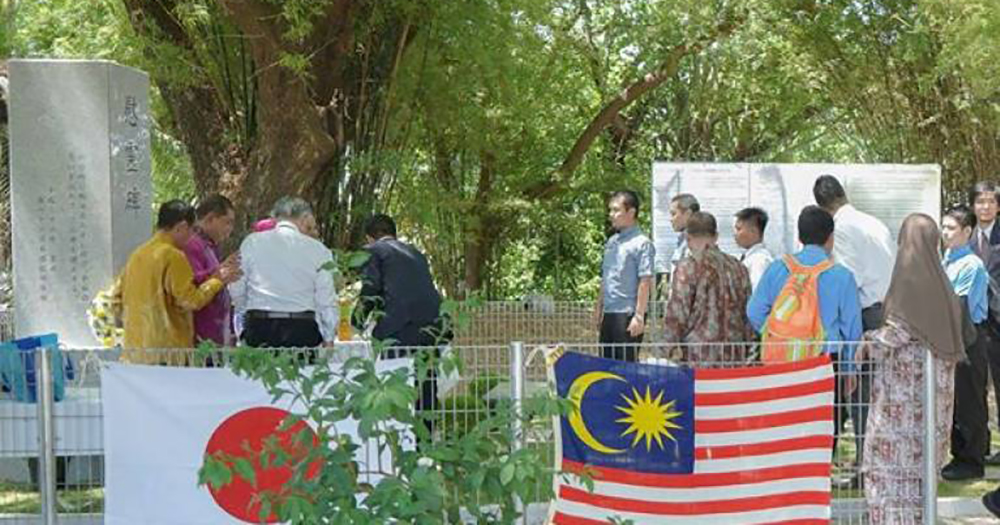When it comes to war memorials, words matter because of the historical weight exerted by past conflicts.
Signboard of restored Malaysian war memorial hailed Japanese soldiers as heroes
On March 21, outrage erupted among many Malaysians when the state government of Kedah unveiled a restored war monument with a signboard that hailed invading Japanese soldiers as heroes, Malaysiakini reported.
The sign board's title read, "History of Three Japanese Heroes who conquered the Alor Setar Bridge".
The backlash resulted in the signboard being removed three days later, on March 24.
What was the context of the signboard?
The signboard said the memorial was a commemoration of the efforts of three Japanese soldiers who died while attempting to secure the Alor Setar bridge on Dec. 13, 1941, during the Japanese invasion of Malaya, The Star reported.
The soldiers were identified as Commander Platoon Lieutenant Hajima Asahi, Corporal Kaneko Juga and Corporal Nakayama.
How did their hero status come about?
Asahi and Juga were said to have been killed by the premature detonation of a bomb Asahi had meant to plant, while Nakayama sustained serious injuries in the ensuing battle with the Allied Forces.
The signboard was also written in three languages -- Bahasa Malay, English and Japanese.
Where is the memorial located?
According to The Star, the memorial is located on a small plot of land beside Sungai Kedah, near the Alor Setar Bridge.
The opening was organised by the Japanese Consulate-General in Penang, the Kedah History Society and the Kedah State Museum.
State Tourism Committee chairman Mohd Asmirul Anuar Aris officiated the event.
Asmirul said the monument had been there since the previous Malaysian government, and the Japanese consulate offered to restore it, as it was dirty and overgrown with shrubs, Malaysiakini added.
Malaysians outraged
The signboard drew the ire of Malaysians, with many Malaysian Chinese politicians in particular condemning the entire monument, The Star highlighted.
The president of the Kedah Chinese Assembly Hall, Cheng Lai Hock, stated that the entire monument was an insult to the victims of the Japanese Occupation:
"The Japanese soldiers could be heroes in the eyes of the Japanese but not in the eyes of Malayans of the time. They were our enemies.
How can we classify enemies as heroes here? It should never have been erected. The state government must rectify the mistake they made."
His sentiments were further echoed by the Malayan Chinese Association's (MCA) secretary-general, Chew Mei Fun, in a Facebook post, in which she called for the monument's immediate demolition.
Chew also questioned if the monument was reciprocal action for Malaysia's attainment of a loan from Japan, likely in reference to the recent 10-year Samurai bond, which is issued by the Malaysian government and guaranteed by the Japanese government.
Even former Malaysian Prime Minister Najib Razak waded into the controversy, indirectly criticising the PH government for their alleged insensitivity in a Facebook post.Translated, it reads:"MCA supporters visited the Japanese hero monument in Kedah today to voice their protest. They wanted to send a clear message to the PH government that this monument represented an insult to all Malaysians."
Signboard removed, "heroes" to be replaced with "soldiers"
Asmirul acknowledged the mistake and removed the sign himself on March 24, Malaysiakini reported:
"I instructed and personally removed the signboard to quickly rectify the matter so that it does not become an issue".
Additionally, the word "heroes" would be replaced with "soldiers" while an additional anti-war message would also be erected at the site.
Asmirul said:
"We will put up an anti-war board. It will serve as a lesson for the future generation to stand against war and racial sentiments that could lead to war and disharmony."
He added that the Japanese consulate would also be informed of the changes.
Top image from Chia Hak Thye's Facebook page.
If you like what you read, follow us on Facebook, Instagram, Twitter and Telegram to get the latest updates.
